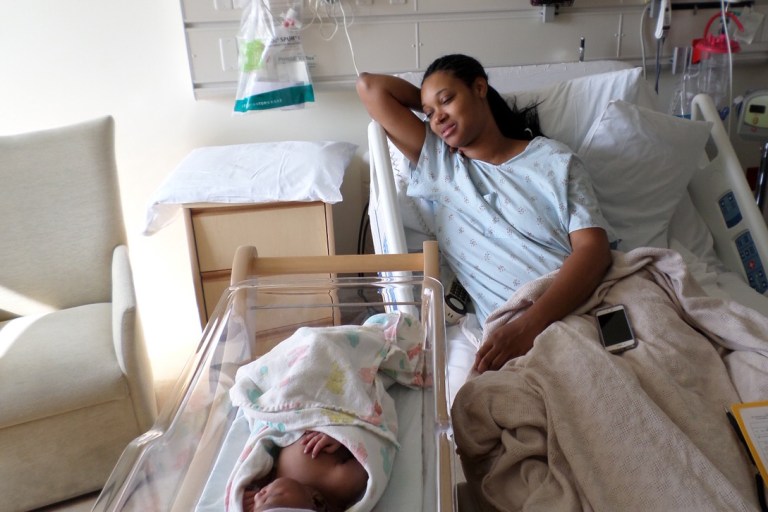
We Need Black Breastfeeding Week—Here's Why
Krystal Duhaney, Black mom and founder of Milky Mama, shares her story.

The disparities faced by Black breastfeeding parents are undeniable.
Black women have the lowest breastfeeding initiation rate of all racial groups at 69%. For white women, that rate stands at 85%.
Just 44% of Black women are still breastfeeding at six months—compared to 62% of white women and 57% of women overall.
And Black mothers experience a disproportionate amount of barriers to breastfeeding, including knowledge about breastfeeding, lack of support from friends and family, insufficient education and support in healthcare settings and concerns about balancing breastfeeding and employment.
When Krystal Duhaney, a registered nurse, had her first child, she was shocked at the lack of support she found for Black breastfeeding parents like herself. Despite raising her questions and concerns with her healthcare providers, she received little help and felt dismissed and ignored.
She knew something had to change. While she was pregnant with her second child, she became an International Board Certified Lactation Consultant (IBCLC) and developed her own original recipe for lactation cookies to help increase her milk production. She went on to launch Milky Mama, a community for breastfeeding parents that provides support, education, empowerment and lactation supplies to help individuals reach their breastfeeding goals.
We sat down with Duhaney to discuss the challenges faced by Black breastfeeding parents and her own personal struggles with breastfeeding as a Black mother. We also talked with her about the history and importance of Black Breastfeeding Week, a movement created in 2013 in response to the decades-long gaping racial disparity in breastfeeding rates. Black Breastfeeding Week kicks off its ninth consecutive year on August 25th.
According to the CDC, far fewer non-Hispanic Black infants are ever breastfed as compared with non-Hispanic white infants and Hispanic infants. More Black infants are also offered formula in the hospital than any other race. Why do you think this disparity exists?
I think this disparity is caused by the lack of support for Black parents in the healthcare field and the generational trauma that Black parents have experienced for centuries. I’m hoping that with extra support for Black parents both prenatally and postpartum, as well as raising awareness to these disparities with things like Black Breastfeeding Week, can help close the gap and provide better breastfeeding outcomes for the Black community.
What challenges did you personally face as a Black breastfeeding mother?
As a Black breastfeeding parent, I felt like I didn’t get much support all around regarding breastfeeding. I would bring up my struggles with my healthcare provider and they would just tell me to offer formula. They never really took the time to refer to a lactation consultant and help me troubleshoot what was going on. And also within my own community I would get questions of, “Why are you still breastfeeding?” or “Why don’t you just give him a bottle?” because there was such a lack of education in regards to the benefits of breastfeeding in our community. I know that many other mothers experience the same thing.
What is Black Breastfeeding Week and why is it important?
Black Breastfeeding Week is about raising awareness about the racial disparities that Black parents face in breastfeeding. It’s also about educating and empowering Black parents to breastfeed their infants.
The infant mortality rate in the Black community is high. Black babies are dying at over twice the rate of non-Hispanic white infants, and African American infants are 3.8 times more likely to die from complications related to low birthweight as compared to non-Hispanic white infants. Black parents face unique cultural barriers within their own community when it comes to breastfeeding and a lack of diversity among lactation consultants.
I’m confident that with extra support and more education that we can increase the Black breastfeeding rates and decrease the rates of racial disparities faced by Black parents in breastfeeding.
What resources helped you and what would you recommend for other Black breastfeeding parents?
The thing that helped me the most while I was breastfeeding was creating a network of support. I connected with my peers—with other breastfeeding and pumping parents to help support me and educate me. The Official Milky Mama Support Lactation Group on Facebook is just that. It’s full of about 30,000 breastfeeding, pumping, formula-feeding and combination-feeding parents just like you, plus some lactation consultants and nurses, to help support, educate and empower you along your journey.
What I also found helpful was taking a breastfeeding course. A breastfeeding course can help educate you before you give birth so you know exactly what to expect when you’re breastfeeding. Breastfeeding 101 is our new online breastfeeding course. You can find it on our website and it is full of information to help you feel prepared to breastfeed like a boss.
I also recommend that Black mothers looking to breastfeed seek out Lactation Professionals that are Black or that have experience/understanding of the unique disparities that face the Black breastfeeding community.
A few other resources for breastfeeding Black parents:
